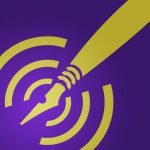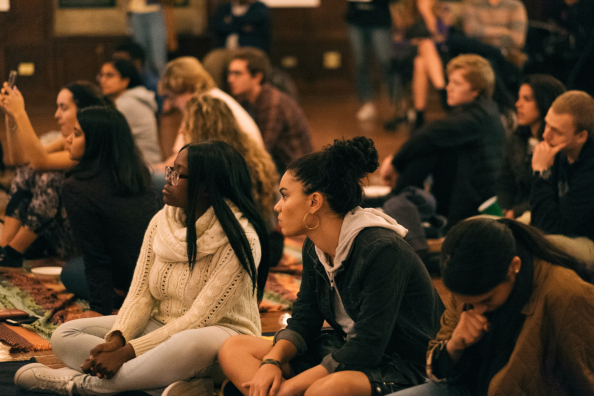As teachers, we spend hours thinking about learning outcomes and competencies as well as developing continua to ensure scaffolding and success for all students in our schools, whether it is in reading, writing, communication, social emotional learning or in other areas of our curricula. This reminded me of how we, as teachers, need a learning continuum ourselves to ensure we keep moving from our point A to our next point B. Sure, we have Professional Development (PD) days and we draw up a Personal Learning Plan or a Growth Plan each year, but how can these be made better? To my knowledge, every teacher has them, so what isn’t working? Why is there continued resistance towards change in the field of Education? Why are we not setting the bar higher?
I recently had the very rare opportunity to take part in a PD day with none other than George Couros (@gcouros), author of The Innovator’s Mindset. As a member of the newly hired staff of École Sage Creek School (#SageCreekLRSD), we spent the greater part of the day discussing as a team the importance and significance of being innovators and wanting the same for our students, as we prepare for the adventure we have ahead – the opening of our new school this September. This is such an exciting and rare experience because all staff members were hired at the same time and therefore, we have the chance to create something amazing, push boundaries, challenge conventional thinking and develop a school culture from the ground up. Everyone on the team is a key player and we, as a staff, understand this. What really empowered me during this PD event was the way all staff members embraced Couros’ message and understood why change in education is necessary. Many who weren’t (yet) connected to Twitter signed up and by the end had posted video reflections and were sending their first Tweets. It was so nice to see my colleagues take risks and step out of their comfort zones because we know that great things never come easy. As a staff, we have a short window of time before our students walk in their classrooms and we need to collaborate more than ever to ensure we aren’t doing “old school in a new building”. Couros set the tone for the path that lies ahead.
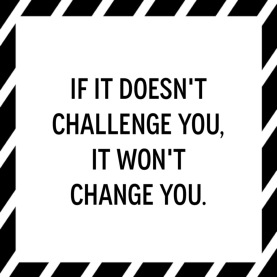
Walking away from this PD day, I realized this one was like no other and was not to be taken for granted! One of the many take-aways I have from Couros is that if you aren’t swimming, you’re sinking. Education is changing and if we aren’t keeping ourselves up to date, we are falling behind. I’ve always been a believer in life-long learning and believe that teachers should hold themselves to the same standards to which they hold their students. We need to learn and continue to learn – all ways and always. This made me think of how PD is done elsewhere and the place that holds Professional Learning Plans or Growth Plans in our schools. In my experience, many teachers roll their eyes when they are reminded to hand in theirs by mid-October. Many choose not to attend other PD opportunities, but complain about what is offered within the division. And those follow up meetings mid-year and end of year sometimes don’t happen. What message is this giving teachers? That their own professional growth isn’t important? That there is no time to discuss how the school and division can support you in your goals? Have you ever known what goals teachers in your building have set for themselves without asking them? Are you guilty of implementing a strategy or reading an article just before your mid-year meeting to look as though you’ve really been reflecting and working towards the goal you’ve set? Why aren’t we sharing our learning with one another?
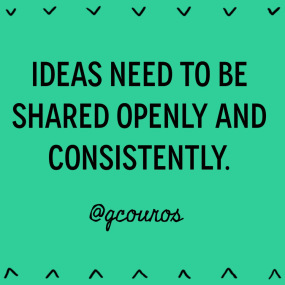
As I reflect on PD events in other schools and divisions, they are (usually) nothing more than pockets of information, given to certain members in the building, who rarely have the opportunity to share their knowledge and learning with staff. If so, it is during a very little allocated time slot within a staff meeting and only if time permits. Rarely do teachers have the time to reflect, plan, try and implement the strategies, tools or practices they’ve learned during their PD. This is true for all of my own PD, except two of which were incredibly meaningful and made an impact on me as an educator. Both were focused on pedagogy and not on curriculum content. Furthermore, many PD days have zero follow-ups and at the best of times, follow-ups are conducted by consultants who participated in the very same one-day workshop.
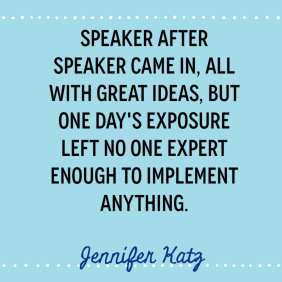
As a teacher, I’m positive I am not the only one who has been frustrated with how quickly initiatives change. When they do, so does PD. It often seems we are switching priorities so often that we feel we never fully reach our set goals. We rarely have the chance to deepen learning because we skim the surface of many initiatives because of the constant changes. Jennifer Katz, author of Teaching to Diversity– the Three-Block Model of Universal Design for Learning, explains, “Racing through one initiative after another with one-off professional development days and no consistent follow-up is destructive to teachers’ feelings of self-confidence.” Not only do many teachers leave the profession because of burn-out, others may feel they don’t measure up when in reality, they are amazing – they just haven’t had the opportunity to shine.
On the bright side, it is clear through the #IMMOOC Twitter chats and the other teachers I follow on social media that PD in education is slowly changing for the better. In one school I know, a PD committee (made up a handful of skilled teachers) is facilitating their learning by setting up Genius Hour-type sessions and had their staff sign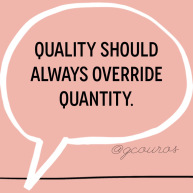 up according to what interested them most. Staff learning from one another within their own building – what a concept! It costs next to nothing (only time), is based on staff’s strengths (and not on what they are lacking) and the greatest advantage is that you have a set of experts on campus that can guide you and support you at any time. I see more schools holding Book Clubs and having meaningful conversations that turn into action and I’ve come to know more teachers who are on Twitter, which tells me they are making use of all the PD available at the end of their fingertips, when and where they please! I see movement in the right direction.
up according to what interested them most. Staff learning from one another within their own building – what a concept! It costs next to nothing (only time), is based on staff’s strengths (and not on what they are lacking) and the greatest advantage is that you have a set of experts on campus that can guide you and support you at any time. I see more schools holding Book Clubs and having meaningful conversations that turn into action and I’ve come to know more teachers who are on Twitter, which tells me they are making use of all the PD available at the end of their fingertips, when and where they please! I see movement in the right direction.
What if…
- What if teachers took more time to live out their Growth Plan instead of limiting themselves to one school year? Why change goals when you can deepen learning?
- What if Growth Plans were co-constructed with a group of teachers in the building to promote collaboration and increase accountability?
- What if all staff members shared their learning with one another and had time set aside to do so?
- What if all teachers viewed all students in the school as their own?
- What if early years teachers knew what middle years teachers were working on?
- What if we took time in our day to reflect on our personal learning so best practices become the new standard?
- What if we used a Google Doc to respond to an email to administrators, so we could see all answers, questions asked, and reflections made that far? Would more teachers give their feedback knowing their answers are recorded? Would this save admins countless hours of reiterating, repeating and summarizing (both inside their office and online)?
- What if we focussed less on “being knowledgeable in all but masters of none”?
- What if teachers had a say in their division’s priorities?
- How would self-confidence rise if all teachers felt supported and heard?
- What if all staff, including administrators, knew each other’s goals? How would we help one another reach them?
In regards to PD, it’s so important that we take the time to reflect and implement what we’ve learned and what 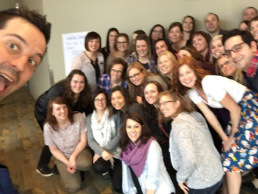 we are learning. I understand there is no one size fits all, but
we are learning. I understand there is no one size fits all, but
there is always room for growth.
We are so very fortunate to work in a 21st century school.
Let’s make sure 21st century learning takes place!

